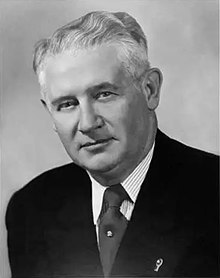Lester C. Hunt | |
|---|---|
 | |
| United States Senator from Wyoming | |
| In office January 3, 1949 – June 19, 1954 | |
| Preceded by | Edward V. Robertson |
| Succeeded by | Edward D. Crippa |
| Chair of the National Governors Association | |
| In office June 13, 1948 – January 3, 1949 | |
| Preceded by | Horace Hildreth |
| Succeeded by | William Preston Lane Jr. |
| 19th Governor of Wyoming | |
| In office January 4, 1943 – January 3, 1949 | |
| Preceded by | Nels H. Smith |
| Succeeded by | Arthur G. Crane |
| 9th Secretary of State of Wyoming | |
| In office January 7, 1935 – January 4, 1943 | |
| Governor | Leslie A. Miller Nels H. Smith |
| Preceded by | Alonzo M. Clark |
| Succeeded by | Mart Christensen |
| Personal details | |
| Born | Lester Callaway Hunt July 8, 1892 Isabel, Illinois, U.S. |
| Died | June 19, 1954 (aged 61) Washington, D.C., U.S. |
| Political party | Democratic |
| Spouse |
Nathelle Higby (m. 1920) |
| Children | 2 |
| Education | Illinois Wesleyan University (attended) St. Louis University (DDS) |
| Military service | |
| Allegiance | |
| Branch/service | |
| Years of service | 1917–1919 (Active) 1919–1954 (Reserve) |
| Rank | First Lieutenant (Active) Major (Reserve) |
| Unit | United States Army Dental Corps |
| Battles/wars | World War I |
Lester Callaway Hunt, Sr. (July 8, 1892 – June 19, 1954), was an American Democratic politician from the state of Wyoming. Hunt was the first to be elected to two consecutive terms as Wyoming's governor, serving as its 19th governor from January 4, 1943, to January 3, 1949. In 1948, he was elected by a decisive margin to the U.S. Senate, and began his term on January 3, 1949.
Hunt supported a number of federal social programs and advocated for federal support of low-cost health and dental insurance policies. He also supported a variety of programs proposed by the Eisenhower administration following the Republican landslide in the 1952 elections, including the abolition of racial segregation in the District of Columbia, and the expansion of Social Security.
An outspoken opponent of Senator Joseph McCarthy's anti-Communist campaign, Hunt challenged McCarthy and his senatorial allies by championing a proposed law restricting Congressional immunity and allowing individuals to sue members of Congress for slanderous statements. In June 1953, Hunt's son was arrested in Washington, D.C., on charges of soliciting sex from an undercover male police officer (homosexual acts were prohibited by law at the time). Some Republican senators, including McCarthy, threatened Hunt with prosecution of his son and wide publication of the event unless he abandoned plans to run for re-election and resigned immediately, which Hunt refused to do. His son was convicted and fined on October 6, 1953. On April 15, 1954, Hunt announced his intention to run for re-election. He changed his mind, however, after McCarthy renewed the threat to use his son's arrest against him. On June 19, Hunt died by suicide in his Senate office; his death dealt a serious blow to McCarthy's image and was one of the factors that led to his censure by the Senate later in 1954.[1]
- ^ "Senator Lester Hunt's Decision". Senate.gov. Washington, DC: Historian of the United States Senate. Retrieved September 7, 2018.